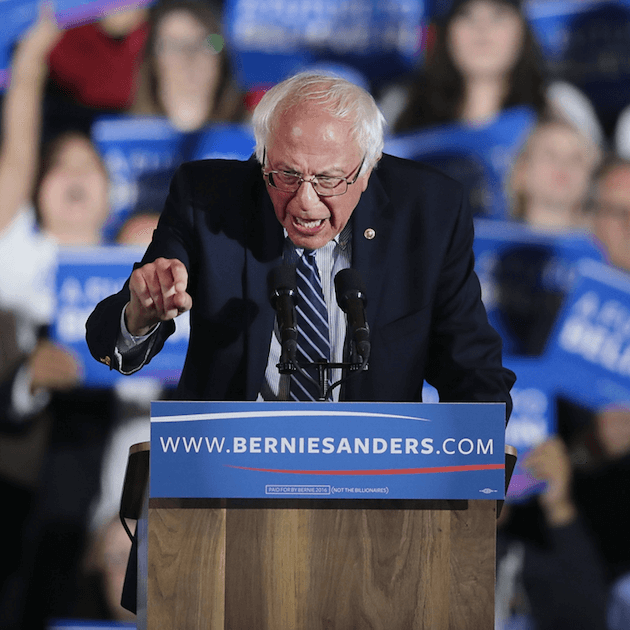In the week following the nation’s final primary in the District of Columbia, Sen. Bernie Sanders has done everything but officially endorse Democratic presumptive nominee Sec. Hillary Clinton. When all is said and done, will Sanders endorse Clinton? And what does his hesitancy mean for a party that is already trying to unite against Republican nominee Donald Trump?
Revolution vs. campaign
Historically, a primary candidate loses his (or in the future, her) momentum when he drops out. The media stops paying attention to his every move. The public stops taking his opinion into account. Ultimately, his political views become conflated with those of his factional opponent — the party’s nominee. We saw it happen to Sen. Ted Cruz, Gov. John Kasich, Sen. Marco Rubio, and Gov. Martin O’Malley. But Sanders has never been an establishment candidate and he’s unwilling to become another number in the two-party system.
Labeling his candidacy a “revolution,” as opposed to a “campaign” has freed Sanders to, somewhat ambiguously, define “success” as he sees fit. Inspiring change does not necessarily require a full-fledged campaign victory. And though Sanders has undoubtedly lost in the primaries, Clinton needs his supporters on her side if she wants to beat Trump. Unlike the former secretary of state, who immediately endorsed then-Sen. Barack Obama after declaring defeat in 2008, Sanders isn’t ready to hand over his voters or delegates so easily.
Sanders’ conceding victory to his opponent prior to July’s National Convention would be the equivalent of folding all his cards and accepting empty-handed defeat. But this isn’t a game of cards.
For the Vermont senator, there’s a silver-lined alternative that doesn’t involve total defeat. By refusing to endorse Clinton just yet, he’s using his leverage among millennial and Independent voters to maintain a stake in Democratic decision-making at the National Convention.
What exactly did Sanders say? … It’s complicated
It wasn’t until after his meeting with President Obama on June 9 that Sanders vowed to participate in the fight against Trump, even if it meant working “together” with Clinton.
Emerging from the White House, he told the press, “I look forward to meeting with (Clinton) in the near future to see how we can work together to defeat Donald Trump and to create a government which represents all of us and not just the 1%.”
[postquote]
On June 12, Sanders still wasn’t ready to allow Democrats a sigh of relief. Though he had promised to work with Clinton, he told reporters that he remains resolute in his plan to bring “this campaign and our ideas for a strong platform” to the Convention. In other words, Sanders will pressure Clinton to adopt parts of his own platform come July.
During a video announcement to his supporters days later on June 16, the candidate prioritized defeating Trump, but didn’t specify what those efforts will entail.
“The major political task that we face in the next five months is to make certain that Donald Trump is defeated and defeated badly,” Sanders said. “And I personally intend to begin my role in that process in a very short period of time.”
He went on to remind his supporters to not dismiss their grass-roots movements as inconsequential, adding that he’ll be keeping his 1,900 or so delegates at the Convention.
“Defeating Donald Trump cannot be our only goal,” he explained. “We must continue our grass-roots efforts to create the America that we know we can become.”
When will he endorse her?
Sanders campaign manager Jeff Weaver told The Washington Post that, contrary to what his recent speeches have suggested, the candidate might endorse Clinton before the National Convention kicks off in Philadelphia. It all depends on how the pair’s policy talks pan out. He added that Sanders, however, will absolutely not “suspend” his campaign, else he loses his policy leverage.
Most surprisingly, Weaver suggested that Sanders could help defeat Trump through other avenues that don’t involve supporting Clinton. Though he didn’t specify what those avenues are, it’s clear that the Sanders camp believes the pressure is just as much on Clinton as it is on Sanders to unite their constituencies.
Our take
Sanders’ cause may not be “noble” in some politicians’ eyes, but only the National Convention alone can reveal whether it was worthwhile and effective. If the Vermont senator is able to cling to his stake as the Party determines its platform, Clinton may actually have a better chance of adopting her opponents’ supporters. Strangely enough, the unconventional move could prove to be beneficial for both Democratic candidates.
Have something to add to this story? Comment below or join the discussion on Facebook.
Header image: Getty









































